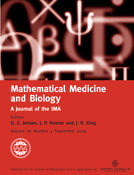-
Views
-
Cite
Cite
Andrei Korobeinikov, Global asymptotic properties of virus dynamics models with dose-dependent parasite reproduction and virulence and non-linear incidence rate, Mathematical Medicine and Biology: A Journal of the IMA, Volume 26, Issue 3, September 2009, Pages 225–239, https://doi.org/10.1093/imammb/dqp006
Close - Share Icon Share
Abstract
We consider two models for the spread of an infection with a free-living infective stage, where parasite reproduction and virulence (parasite-induced mortality) depend on the parasite dose to which the host is exposed and are given by unspecified non-linear functions of the number of the free pathogen particles, and the incidence rate is non-linear. We study the impact of these non-linearities with the focus on the global properties of these models. We consider a very general form of the non-linearities: we assume that the virulence and the parasite reproduction rates are given by unspecified non-linear functions of the number of the free pathogen particles and that the incidence rate is an unspecified function of the number of susceptible hosts and free pathogen particles; all these functions are constrained by a few biologically feasible conditions. We construct Lyapunov functions that enable us to find biologically realistic conditions which are sufficient to ensure existence and uniqueness of a globally asymptotically stable equilibrium state. Depending on the value of the basic reproduction number, this equilibrium state can be either positive, where parasite endemically persists, or infection free.





